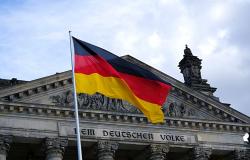What’s worth fighting for: Germany’s new National Security Strategy needs a narrative

Cornelius Adebahr argues that the new strategy lacks a committed and engaging narrative at a time when the world looks increasingly dangerous.
The speeches on the first anniversary of Russia’s war on Ukraine have been delivered, and so have the comments dissecting Germany’s ensuing Zeitenwende, or historical turning point. Here’s the short version: the war will go on for a long time and demand a lot from Europe. Germany, for its part, has shown solidarity with Ukraine and drastically reduced its dependence on Russian oil and gas. However, the necessary transformation of the Bundeswehr for more effective national and alliance defence is still in its infancy – the outcome remaining uncertain.
In contrast, a realistic view of tomorrow’s challenges that goes beyond reflexive references to the end of old certainties is hardly discernible within the Berlin bubble. That is where the planned National Security Strategy could and should offer orientation. However, this still-pored-over document risks being watered down by bureaucratic bickering within the federal government and thus ending up without real value or effect.
That would be a missed opportunity, because – beyond any potential institutional rejigging – the strategy’s actual significance lies above all in the narrative it can deliver. How does the world of tomorrow look like, for which Germany must prepare today? What is the country’s role in this new era that has now inevitably begun? Precisely because the outlook is rather bleak – which makes this Zeitenwende so much different from the one of 1989/90 – such an explanatory, encouraging narrative is needed, for the people as much as for politicians.
Narratives provide orientation, at least for as long as they fit. As a tool to create meaning, they provide a basic measure of self-assurance in times of global upheaval. In addition, they contribute to internal discursive power (Deutungshoheit) by defining the space within which the Germany’s foreign policy can be debated. Finally, they act as a signal to the world, be it to communicate reliability to one’s own partners or to take a stance vis-à-vis one’s opponents in the emerging systemic competition.
A narrative is also needed because much of the vernacular of German foreign policy appears outdated. Whether it’s the “honest broker” or “effective multilateralism”, “never again war” or “change through trade” (Wandel durch Handel) – after decades of use, these words cloud more than they elucidate.
So, what could be a leitmotif for German’s security strategy?
On the one hand, there is the “fair partner and mediator” which a Citizens’ Assembly convened by the Bundestag in 2021 used to describe Germany’s role in the world. Yet, Russia’s aggression against Ukraine has made clear that Berlin stands with the attacked, and therefore cannot mediate between Kiev and Moscow or, in a global context, between the United States and Russia or China. On the other hand, the government’s feminist foreign policy is still too untested and politically controversial even within the coalition to align the country’s first security strategy with it.
Nevertheless, the core of feminist foreign policy is a comprehensive understanding of human security, which can provide useful direction here. It means that, in addition to the military, police and diplomacy, ‘soft’ factors such as development, climate and migration are also decisive for a country’s prosperity and security in the international context. This goes hand in hand with a shift away from centuries-old state-centredness towards a focus on societies and individuals as the living core of any political order.
The German government wants build on this understanding by making “integrated security” the core of the strategy. However, this concept must be made narratable and thus relatable to citizens in the country – so that they don’t take it for a new car feature or for all-round home protection. Yet, adequately addressing the various connections between external and internal policies is highly complex – for example, between Chinese investment strategies and the German Mittelstand, between energy supplies from autocratic countries and municipal utilities, or between global climate finance and local floodings.
Ultimate, integrated security means little other than that security can only be achieved by joining forces – whether as a government or as a society. The new National Security Strategy should therefore send out a message to Germans that says: We see the world with clear eyes, we recognise the opportunities as well as the risks of this new era, and we are preparing ourselves for this at home as well as with partners internationally. At the same time, it should say that everyone must pitch in, to put it bluntly. Because security is everybody’s business, and a country’s much-vaunted resilience needs companies and universities just as much as municipalities and cultural associations. Only internal strength can permanently build up an external posture.
“Living securely together” – this could therefore be the new strategy’s clear message. It offers meaning through a common understanding of comprehensive security, provides discursive power regarding the growing systemic rivalry, and sends a strong signal of one’s own preparation. For Zeitenwende starts in the mind. As the main character in Giuseppe di Lampedusa’s novel “The Leopard” said about the political and social upheavals in Italy in the late 19th century: Things will have to change if we want them to stay as they are...
Today, too, fundamental change is needed to preserve security and prosperity in an increasingly confusing and dangerous world. Especially in this moment of geopolitical upheaval, the image of a desirable future is needed to guide state action and public discourse. Without a committed and engaging narrative, Germany’s first security strategy will not rise above the status of paper tiger.
Photo by Ingo Joseph


